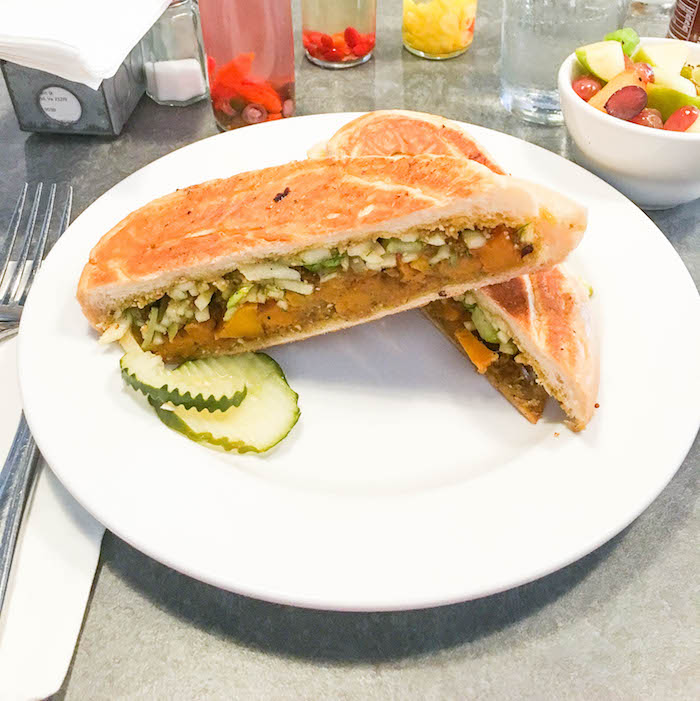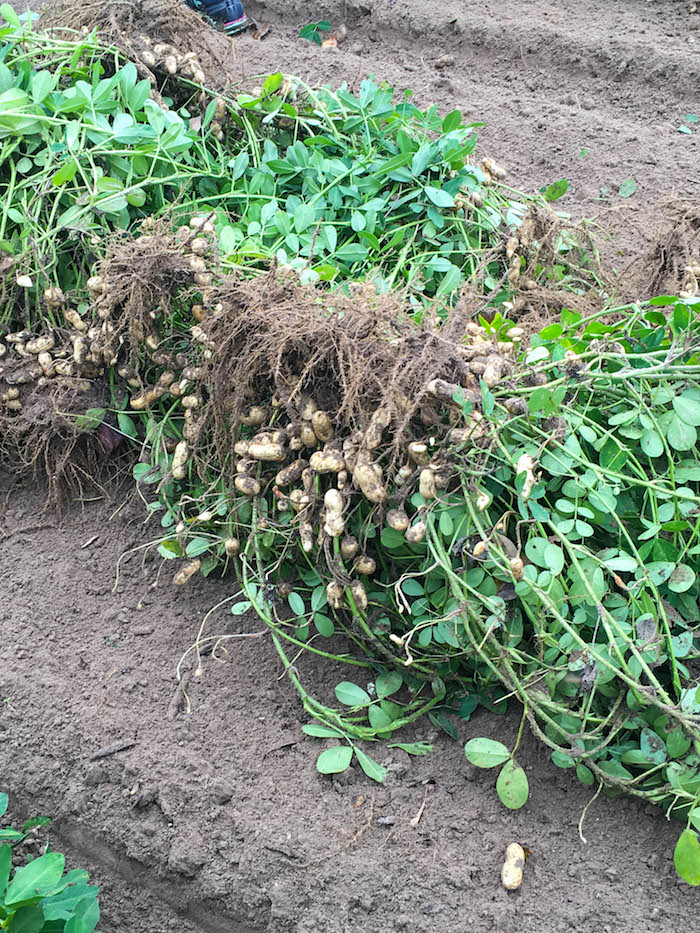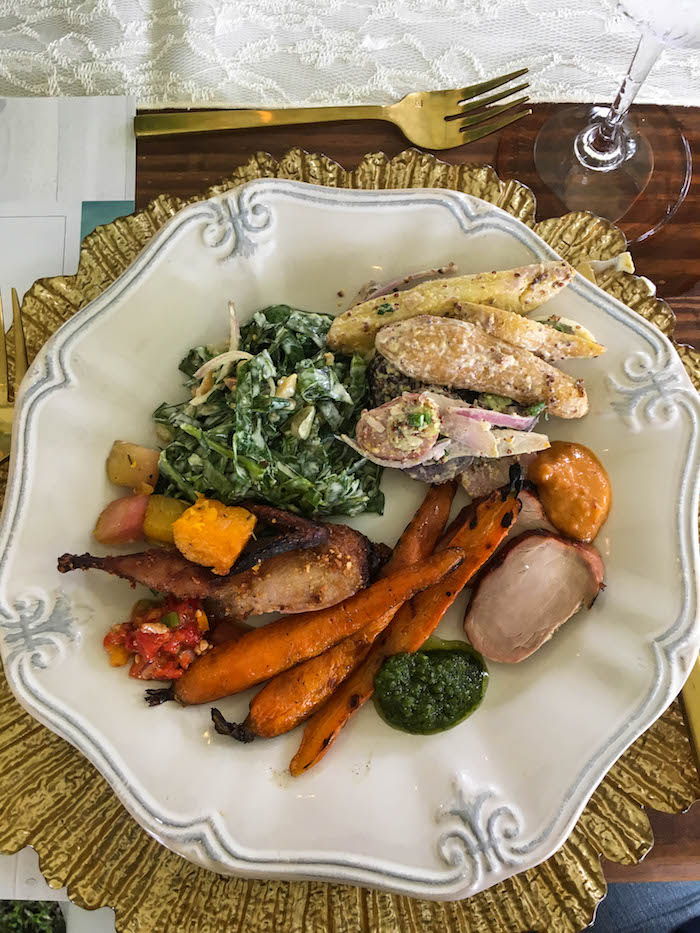Spicy Peanut Hummus Recipe
Sharing my trip to a peanut farm to learn all about America's favorite nut, plus a recipe for a spicy peanut hummus made with peanut butter!
My trip to Richmond was sponsored by the National Peanut Board. I was not compensated to write this post.
Last week I had a quick trip to Richmond with the National Peanut Board to learn all about peanuts and visit a peanut farm. As a peanut butter fanatic, I was really excited to spend a couple days eating peanuts and playing on the farm.
I arrived in Richmond a bit early with a couple other attendees and the dietitians and PR agents with the board, so we all grabbed lunch together at Citizen. The menu was a modern, fusion-y take on Central American food, with mofongo, papusas, and tortas. It was really hard to decide, but our waiter recommended one of their vegetarian sandwiches, roasted butternut squash with celery-apple slaw and cashew butter on pressed bolillo bread, so I went with that. Sounds like a totally random combination, but the combination of the sweet and creamy squash and cashew butter with the fresh and tart slaw was SO good. And that bread y'all....
Our first scheduled event was dinner, so I took the afternoon to get some work done and go on a training run around town. Although I don't know how much training I actually got since I stopped to take pictures every few minutes.
Our group of 15 dietitians was treated to an incredible peanut-centric dinner cooked in front of us by the James Beard award winning chef at The Roosevelt, who happened to graduate from Clemson AND my husband's high school - small world! While we enjoyed a Southern inspired meal and Virginia wine, we learned all about the culinary uses of peanuts and the history of peanuts.
The next morning, we took a long bus ride from our hotel out to Drewryville to visit the Pope family peanut farm. The Pope's are a family of farmers that's been growing peanuts since the 1800s. All three brothers and their wives live in old farmhouses on the property, so it's truly a family affair! Their house is a fully restored 1700s farmhouse and it's absolutely incredible.
We took a tour of the farm and learned how peanuts are grown - underground if you didn't know! They use a special tractor that goes through the field, pulls up the peanut plant, and flips it over so the peanuts are exposed. Then the peanuts are then left to dry in the field before going out to production.
After touring the fields, we were treated to another amazing meal featuring peanuts. And seriously, how gorgeous is the table setting? I felt like we were at a wedding!
On the drive back to the airport, we learned more about peanuts from Sherry, the peanut RD. Of course we discussed nutrition, but what I thought was most interesting was the information on sustainability and peanut allergies.
Because peanuts are small plants grown underground, they only require 4 gallons of water per ounce, a tiny amount compared to most other nuts or even other vegetables and fruits. Peanuts are agriculturally a legume (aka bean), meaning they are nitrogen-returning. On farms, peanuts are an important crop rotation plant, often grown between cotton harvests to improve the soil.
Since I don't work with many clients with food allergies or children, I've been been behind on current research on peanut allergies. I knew peanut allergies (and allergies in general) are on the rise, I didn't realize it's only .6% of the population. With all the talk of banning peanuts in schools, I thought it would be much higher. And actually, studies on banning peanuts in school have not been shown to lower the risk of reactions. What works better is teaching students proper hygiene and safe handling. Which I suppose makes sense. It's kinda like sex education - you can't expect that it's never going to happen!
It used to be that parents were instructed not to feed their children peanuts until a certain age to prevent allergies. But more recent research has shown feeding kids peanuts early, even those at high risk for allergies, decreases the risk of a peanut allergy by 70-86%!
Another thing we learned about was the importance of doing a challenge test (with the doctor!) if you had a peanut allergy as a child. Because allergies can decrease over time, there are many people who were allergic as a child but no longer as an adult. Even if you fail a challenge test, it increases quality of life because then at least you know! It reminded me a lot of what I do with my food sensitivity clients (I work with clients providing food sensitivity testing - different than an allergy - and personalized nutrition counseling for it). When people are sick, they often play around with their diet on their own, but that confusion over what's actually causing their symptoms creates a lot of anxiety around food. By eliminating for a period of time and carefully reintroducing, it helps you feel more empowered and confident with your food choices. So if you had a peanut allergy as a child and have been avoiding them since, it may be time to talk to your doctor about a challenge test!
We had a ton of amazing peanut-infused dishes, but one that looked simple to recreate at home was the creamy peanut hummus we ate at the farm. They made basic hummus and replaced the tahini with peanut butter! To highlight how peanuts can be used in a variety of cuisines, I decided to take a fun spin on their peanut hummus by adding ginger, soy sauce and chili for a bit of heat. I served this with tortilla chips, but I think it actually would have been better with brown rice crackers and crudites, like raw carrots, sugar snap peas, and cucumber.
Spicy Peanut Hummus Recipe
Ingredients
1 14-ounce can garbanzo beans, drained and rinsed
3 tablespoons peanut butter
1 serrano chili, seeded and minced
1 garlic clove, minced
2 teaspoons grated fresh ginger
2 teaspoons soy sauce
1 teaspoon honey
1/4 cup extra virgin olive oil
Instructions
In a food processor, blend garbanzo beans, peanut butter, 3/4ths of the chili, garlic, ginger, soy sauce, and honey until starting to get creamy. Stream in olive oil with the motor running. Taste and season with salt if needed. Serve garnished with cilantro, peanuts, scallion and chili.























